Zoom+Focus DIGITAL
Sonntag, 5. Juli 2020
Herzlich willkommen zur Konzertreihe ZOOM+FOCUS der Kompositionsklassen der Universität der Künste Berlin und der Hochschule für Musik Hanns Eisler Berlin. Zweimal im Jahr stellen Studierende ihre im Laufe des vorangegangenen Semesters entstandenen Werke vor.
Nach der vorläufigen Absage des diessemestrigen Live-Konzerts erarbeiteten Anaïs-Nour Benlachab, Jakob Böttcher, Anda Kryeziu, Eli Simic-Prosic, Luca Staffiere und Dustin Zorn audiovisuelle Stücke zur virtuellen Präsentation – ZOOM+FOCUS DIGITAL.
Im Anschluss standen die Komponist*innen in einem Video-Talk für Fragen und Antworten zur Verfügung, moderiert von Prof. Kirsten Reese.
Leitung: Leah Muir
Tutor: Alexander Choeb
Moderation Gespräche: Prof. Kirsten Reese
Bitte beachten Sie auch folgende Veranstaltungen:
• ZOOM+FOCUS ANALOG
im Rahmen von „KUNST RAUM STADT – Eine Demonstration für die Künste in Zeiten der Krise“ der UdK Berlin
16. Juli 2020 um 16 Uhr
Wandelkonzert unter freiem Himmel
Treffpunkt: Bundesallee 1–12, vor dem Eingang
Bitte Mund-Nasen-Schutz mitbringen!
• Virtuelles auf die Straße!
Elektroakustische Interventionen aus dem UNI.K | Studio für elektroakustische Komposition, Klangkunst und Klangforschung im Rahmen von „KUNST RAUM STADT – Eine Demonstration für die Künste in Zeiten der Krise“ der UdK Berlin
16. Juli 2020, 18–20 Uhr
Fasanenstraße 1B
Details werden unter www.klangzeitort.de bekanntgegeben.
Bitte Mund-Nasen-Schutz mitbringen!
Das programm
Anda Kryeziu - “LAND”
Dustin Zorn - “Goup”
Jakob Böttcher - "ottos mops für drei stimmen“
Anaïs-Nour Benlachhab - “Callejero”
Eli Simic-Prosic - “Anatomies of the Self”
Luca Staffiere - “There’s a part of my head that sounds like this”
Anda Kryezui
LAND
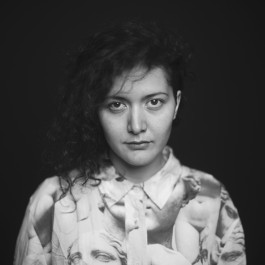
Anda Kryeziu - Komponistin, Interpretin und multimediale Künstlerin aus Kosovo. Sie schloss das Master Studium in Klavier bei Konstantin Lifschitz und nebenbei Komposition bei Dieter Ammann ab. Später studierte sie den Master Komposition in der Klasse von Caspar Johannes Walter in Basel und später bei Daniel Ott in Berlin. Sie ist Laureatin des Hauptpreises von Balkan Composer Competition 2019, Stipendiatin der Contemporary Arts Alliance Berlin und Akademie Musik Theater Heute der Deutsche Bank Stiftung. Der Fokus ihrer Werke trifft diverse Spalten wie Instrumentalmusik mit und ohne Live Elektronik, Multimedia und Musiktheater. Zurzeit vertieft sie ihr Elektroakustischen Kompositionsstudium weiter an der Hfm “Hanns Eisler” in Berlin bei Wolfgang Heiniger.
Foto © Jetmir Idrizi
Dustin Zorn
Goup
Gesang: Camilla Mandilo, Artyom Wasnetsow
Goup ist aus zwei Aufnahmesessions mit einer Sopranistin und einem Bass entstanden. Mein Interesse galt hierbei dem Übergang zwischen dem Hören von Orten und dem Hören von Räumen. Lediglich die Abspielgeschwindigkeit sowie die Verräumlichung des Materials variieren, so dass ein Spektrum entsteht in denen teils die konkreten Klänge, teils ihre Verarbeitung die Hörperspektive dominieren. Das Ursprüngliche Konzept dieses Stück mit 18 Lautsprechern im Raum umzusetzen konnte nicht stattfinden, so dass diese binaurale Reduktion am besten mit Kopfhörern zu hören ist.
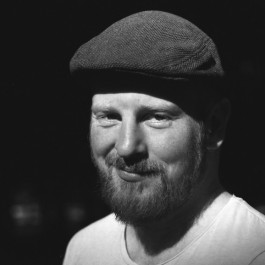
Dustin Zorn wurde 1990 in Wuppertal geboren. Derzeit studiert er Komposition und elektronische Komposition an der Hfm- Hanns Eisler Berlin bei Prof. Eun-Hwa Cho und Prof. Wolfgang Heiniger. Er ist mehrfacher Preisträger von „Jugend Komponiert“ und gewann unter anderem 2016 den Helmut-Sommer- Kompositionspreis. Stücke von ihm wurden im Deutschlandfunk, beim Festival Ultraschall, in der Klangwerkstatt, bei den Randspielen in Zepernik, im BKA Berlin und den Neuköllner Originaltönen aufgeführt. Seine Stücke werden aufgeführt von Ensembles wie dem Duo Luko und dem Ensemble Lux:NM und dem Echo Ensemble.
Foto © Lena Krenz
Jakob Böttcher
ottos mops für drei Stimmen
ottos mops trotzt
otto: fort mops fort
ottos mops hopst fort
otto: soso
otto holt koks
otto holt obst
otto horcht
otto: mops mops
otto hofft
ottos mops klopft
otto: komm mops komm
ottos mops kommt
ottos mops kotzt
otto: ogottogott
Ernst Jandl
Als kleines Kind hatte ich ein Bilderbuch mit dem Jandl-Gedicht, was ich mir ständig ansah, und seitdem hat mich die Faszination über diesen ungewöhnlichen Umgang mit Sprache nicht mehr losgelassen. So kam mir dieses Gedicht in einer kompositorischen Phase, in der ich mich viel mit Sprache und Phonetik beschäftigte, als Ausgangsmaterial sehr gelegen. Ich begann damit, mit den Worten des Gedichts neue Verse zu schreiben und Bedeutungen umzudrehen oder ad absurdum zu führen. Ich entwarf ich die „Stopplaute“, das sind Klänge, die mit einem vokalartigen Klang beginnen und abrupt mit einem „t“ oder einem „p“ abgestoppt werden. Meine täglichen Gedanken über das Weiter-Schreiben, die ich in „Feed Sheets“ - einer Art Kompositionstagebuch - festhielt, werden an einzelnen Stellen verklanglicht, und ein Stückweit wird so der kompositorische Ideenprozess selbst zum Werk. Die eigentlich szenische Konzeption des Stückes habe ich für die Audio-Fassung angepasst.
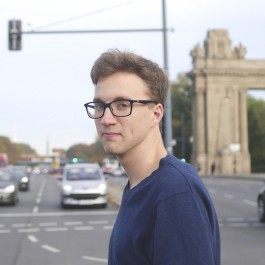
Jakob Böttcher (*1999 in Hamburg) ist Komponist, Musiker und Denker und organisiert regelmäßig interdisziplinäre musikalische Projekte. So entwarf und drehte er zum Beispiel 2020 mit Laien das „klangflächenkunstwerk“, einen improvisierten Film über Farbe. In seinen Stücken beschäftigen ihn u.a. surrealistische Denkansätze, Klang und Syntax von Sprache und szenische Momente. Seit 2019 ist er Leiter des Ensembles Junge Musik Heimfeld, mit dem er neue Konzepte alter Musik realisiert. Er studiert Komposition bei Mathias Hinke und Tonmeister*in an der Universität der Künste Berlin.
Foto © Jakob Böttcher
AnAïs-Nour Benlachhab
Callejero
Akkordeon: Lucie Nigoule Bellonet, Maylis Arrat
Video: Claire Devillers
This piece is in hommage to my friend Joaquim Tougeron, murdered the 2nd of November 2017 in Montpellier, France. Callejero deploys a dramaturgy, whose narration is revealed through the relationships of musical ambiguities of its various characters. Their posture reveals their words, sometimes in immobility, suspension, sometimes in action and gesture. So, electronics is embodied, it decides and connects. In the manner of a theatre scene, where during the flood of movements, he would always remain a silent witness on stage.
La calle
Es una calle larga y silenciosa.
Ando en tinieblas y tropiezo y caigo
y me levanto y piso con pies ciegos
las piedras mudas y las hojas secas
y alguien detrás de mí también las pisa:
si me detengo, se detiene;
si corro, corre. Vuelvo el rostro: nadie.
Todo está oscuro y sin salida,
y doy vueltas y vueltas en esquinas
que dan siempre a la calle
donde nadie me espera ni me sigue,
donde yo sigo a un hombre que tropieza
y se levanta y dice al verme: nadie.
This is a long and quiet street.
I walk in darkness and I stumble and I fall and
I get up and I step with blind feet
on the dumb stones and on the dry leaves
and someone behind me also steps on them:
if I stop, he stops;
if I run, he runs. I turn my face around: no-one.
Everything is dark and dead-end,
and I go round and round in corners
that always lead to the street
where no one is waiting for me or following me,
where I follow a man who stumbles
and gets up and says on seeing me: no one.
Octavio Paz 1990
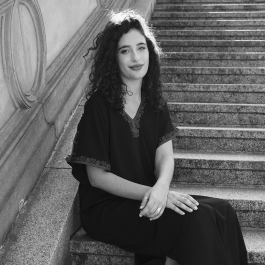
Anaïs-Nour Benlachhab is a musician, composer and painter born in 1996 in France. Her exploration of sound is embodied through hybrid works linking different arts. Each invention is driven by a deep human commitment that is reflected in artistic form. The work, like the artist, is influenced by the intersections of her multicultural identity, encouraged her interest in traditional music Through the integration of “oral" music. Firstly graduated in classical guitar and ballet at the Conservatoire de Montpellier, she continued her studies at the University Jean- Jaure s and at the Conservatoire de Toulouse where she obtained a Bachelor of composition and musicology. She also studied jazz in the band of the saxophonist Abdu Salim. Currently, she lives in Berlin where she continues her artistic and musical researches in Master studies at the Hochschule für Musik of Berlin Hanns Eisler.
Foto © Elise Carreau
Eli Simic-prosic
Anatomies of the Self
The piece looks at the idea of human identity as a constantly proliferating multitude, an (in)balance of different elements pushing and pulling a person in different directions. The performer plays solo and yet speaks in an internal monologue while fantasies of the single line’s multiplication and modification dance unpredictably around the installation. The three elements morph, shape and transform each other in creating the fundamental flux and drama of a constituted subject, reflected publicly in the spatial orientation of the sound, originally for an 18-channel presentation on special "sound-dice” speakers and presented here in a stereo mix.
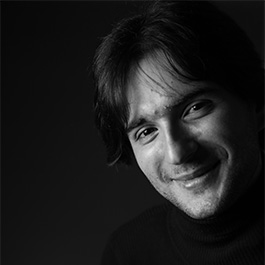
Eli Simic-Prosic (b. 1992) is an Australian composer, pianist, writer and curator based in Berlin. Particularly interested in the idea of music as composed time and vessel for memory, in his recent work Eli seeks to integrate aspects of theatre, ritual and expanded instrumental technique into an organic compositional practice which explores the possibilities of creating novel dramatic events, intimate spaces and temporal geographies between the bodies of performers and the audience. His works have been played by Halfsound Duo, Nick Slaney, Ensemble Con Fuoco, Plexus, the University of Melbourne Symphony Orchestra, the Shanghai Philharmonic Orchestra, Rubiks and ELISION. Completing his BMus (Honours) from the University of Melbourne in 2019, Eli is the recipient of the 2019 AE Floyd Memorial Scholarship and is currently undertaking his master’s studies in composition at the Universität der Künste Berlin with Daniel Ott. He has in the past studied with Kevin March, Linda Kouvaras, Katy Abbott, Julian Yu, Elliott Gyger and Brenton Broadstock and has had individual lessons with Chaya Czernowin.
Foto © Eli Simic-Prosic
Luca staffiere
There’s a part of my head that sounds like this
The clanging of pipes and tin containers, the clank of chains, yes, the thud of wooden shafts, the humming of relentless machineries, keynotes of an industrial soundscape, yes, echoing in the distance, no, sometimes behind the corner, out of your window, close but, no, muffled by our attention, diverted elsewhere. It somehow, yes, stuck and planted itself in my mind, spun so many different ways of reacting, imitating and recreating an idiosyncratic (no?) sensation. Yes, and I want to go back, yeah... to the source, yes.
Source of the videos:
Custom Videoreactive Patch (Max/Msp)
Video Recording: Luca Staffiere – „Integrationspolitik“ for Piano, Saxophone and Percussion (2018)
Videoclip: Einstürzende Neubauten – „Autobahn“ (1981)
Video Recording: Construction work in Friedrichstraße, Spring 2020.
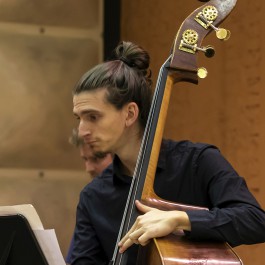
Luca Staffiere was born 1990 in Salerno, Italy. After his Bachelor in Foregin Languages, literatures and culture of Europe and America he traveled to Berlin, where he did a master in european ethnology. Since 2017 he studies composition with Prof. Manolis Vlitakis at the University of Art. In Berlin he is active as a composer of contemporary music as well as a double-bass player in the the ensemble of traditional music „Al-Troubaz“. His pieces have been played by ensembles as Ensemble Adapter and Trio Noir as well as soloists like Henriette Scheytt.
Foto © Erik-Jan Ouwerkerk
GESPRÄCH UND DISKUSSION
Im Anschluss an das Konzert standen die Komponist*innen in einem Video-Talk für Fragen und Antworten zur Verfügung, moderiert von Prof. Kirsten Reese.





